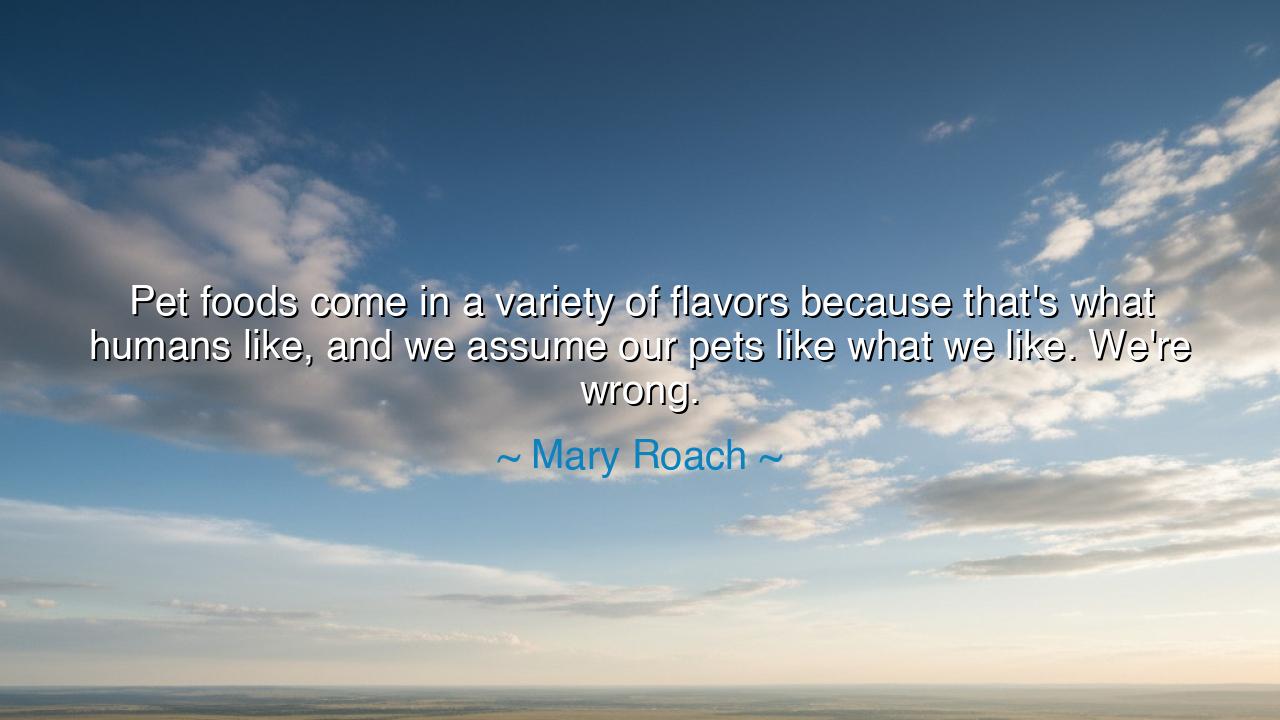
Pet foods come in a variety of flavors because that's what
Pet foods come in a variety of flavors because that's what humans like, and we assume our pets like what we like. We're wrong.






Mary Roach, with the sharp wit of a seeker of truth, once said: “Pet foods come in a variety of flavors because that’s what humans like, and we assume our pets like what we like. We’re wrong.” Beneath the humor of this observation lies a profound truth about the blindness of mankind: that we often see the world only through the mirror of our own desires, projecting our appetites and tastes onto others, even upon the creatures who share our homes and lives. This saying is not about food alone—it is about humility, about learning to see beyond the prison of the self.
The flavors of pet food—beef stew, roasted chicken, salmon filet—are chosen not for the palate of the animal, but for the imagination of the human buyer. We dress the meals of our dogs and cats in the garments of our own cravings, forgetting that their senses are not our senses, their hungers not our hungers. The dog finds greater joy in the scent of a rotting bone than in our seasoned roast. The cat thrills to the essence of blood and flesh, not the romance of “turkey dinner with gravy.” Roach reveals our folly: in trying to honor them, we often deceive ourselves.
The ancients also knew this danger of projection. The Greeks warned of Narcissus, who drowned in the love of his own reflection. In like manner, we drown others in our image, assuming they must think as we think, hunger as we hunger, live as we live. Yet true wisdom lies in recognizing the difference of the other, in honoring the foreignness of their being. To see the world only through human desire is to blind ourselves to the richness of creation.
History offers striking parallels. When European explorers arrived in distant lands, they often tried to feed indigenous peoples their own foods, dressing them in their fashions, teaching them their ways—believing that what was fitting for themselves must be fitting for all. But often these attempts brought suffering, for the bodies and cultures of those peoples were attuned to different rhythms, different diets, different ways of life. Just so with our pets: when we insist they must love as we love, we impose a burden rather than a blessing.
What Mary Roach unmasks is not just a quirk of marketing, but a flaw of the human spirit: the arrogance of assuming our way is the only way. To love another being—whether person or pet—is not to impose our joys upon them, but to learn what their joys truly are. To force upon them flavors meant for us is to love ourselves, not them. To discover what they need, what they relish, what they thrive upon—that is the true art of compassion.
The lesson is therefore luminous: humility is the foundation of love. Do not assume, but observe. Do not impose, but learn. Whether with animals or with people, cast off the arrogance of projection and instead practice the discipline of attention. The dog’s joy is not the human’s joy. The cat’s hunger is not the human’s hunger. And the soul of another is never nourished by what we alone desire, but by what they themselves need.
Practical action flows from this truth. If you are a pet owner, study your animal. Learn their instincts, their preferences, their nature. Do not buy food because its name pleases you, but because it nourishes them. Extend this lesson further: with your family, your friends, even strangers, ask not, What would I want? but What do they need? In this shift lies the root of compassion, the breaking of self-centeredness, the beginning of true wisdom.
Thus Mary Roach’s playful words become a commandment for the ages: Love is not projection, but perception. Do not love others as yourself alone, but love them as themselves. In this lies not only the proper feeding of animals, but the proper feeding of souls. And he who learns this lesson will no longer live in illusion, but in truth, walking the earth with eyes open and heart awakened.






AAdministratorAdministrator
Welcome, honored guests. Please leave a comment, we will respond soon